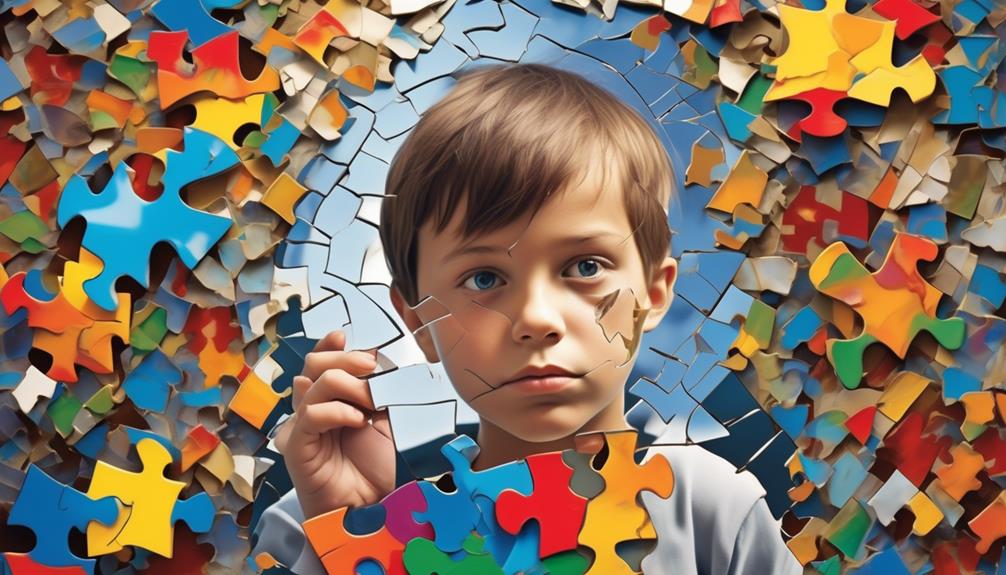When exploring how parents’ mental health affects their children in intricate ways, there is a certain aspect that tends to remain unclear.
The experiences of children with fathers who have Borderline Personality Disorder (BPD) are multifaceted and can have far-reaching consequences.
Exploring the nuances of this dynamic sheds light on the intricate interplay between parental struggles and their offspring's well-being, prompting reflection on the importance of tailored support systems and interventions.
The intricate tapestry of challenges faced by these children beckons us to delve deeper into the realm of familial dynamics and mental health implications, urging us to consider the significance of early intervention and holistic care.
Key Takeaways
- Children may struggle with secure attachments and trust.
- Emotional instability can hinder self-esteem and relationship development.
- Therapy and self-compassion are crucial for coping and healing.
- Boundaries, communication skills, and relationships may be affected long-term.
Impact on Emotional Development
Children growing up with fathers who've Borderline Personality Disorder often face significant challenges in their emotional development. The emotional turmoil and instability caused by a father's BPD can deeply impact a child's sense of self.
Constantly navigating through the unpredictable emotional landscape of their father can leave a child feeling confused and distressed. This ongoing exposure to intense emotional behaviors can hinder the child's ability to regulate their own emotions effectively, leading to struggles with low self-esteem and heightened sensitivity.
Children of fathers with BPD may find themselves on edge, always anticipating the next emotional outburst or manipulation, which can create a pervasive atmosphere of fear and unease. Such an environment can stunt the child's emotional growth and stability, making it difficult for them to establish a strong foundation for healthy relationships in the future.
The emotional rollercoaster imposed by a father with BPD can leave lasting scars on a child's psyche, shaping their emotional development in profound ways.
Challenges in Forming Relationships

Navigating the tumultuous emotional landscape created by a father with Borderline Personality Disorder can present significant challenges in forming secure and trusting relationships for individuals who grow up in such environments.
Children of fathers with BPD often face difficulties in establishing secure attachments due to their father's emotional instability. The unpredictable behavior and lack of emotional stability in BPD fathers hinder the development of healthy relationships with their children. This struggle to build trusting relationships with a BPD father can have lasting effects on a child's emotional well-being and sense of security.
Additionally, these challenges can lead to obstacles in developing healthy boundaries and communication skills within relationships. The continuous battle to navigate the complexities of interacting with a father who's Borderline Personality Disorder can impede a child's ability to form the strong, stable connections necessary for healthy emotional development.
Psychological Effects in Adulthood
Growing up with a father who's Borderline Personality Disorder can have long-lasting psychological effects on individuals in their adult years, impacting their emotional regulation and interpersonal connections.
- Anxiety: Adults with fathers who've BPD may struggle with persistent feelings of anxiety, stemming from the unpredictable and chaotic environment they experienced in childhood.
- Depression: The emotional neglect or instability they faced growing up could contribute to persistent feelings of sadness and hopelessness in adulthood.
- Identity Disturbances: Individuals may find it challenging to form a stable sense of self, as their father's BPD behaviors may have influenced their own self-perception.
- Boundaries: Difficulties in setting and maintaining boundaries in relationships can lead to issues such as codependency or difficulties asserting one's needs.
- Self-Esteem: The constant criticism or invalidation from a father with BPD can result in low self-esteem and a lack of confidence in one's abilities.
These psychological effects often require therapeutic intervention and support to navigate the complex emotional and relational challenges that stem from growing up with a father with Borderline Personality Disorder.
Coping Strategies and Healing

In our journey towards healing from the impact of a father with Borderline Personality Disorder, it's essential to cultivate self-compassion and seek professional support. Children of Fathers with Borderline Personality Disorder often face complex challenges that require effective coping strategies for healing. Therapy can be a valuable tool in understanding and addressing the emotional impact of growing up with a father exhibiting manipulative behaviors and emotional blackmail. By recognizing these patterns, individuals can develop healthier ways to navigate their relationships and prioritize their emotional well-being.
Embracing self-compassion is key to overcoming the scars left by a father with BPD. This involves being kind to oneself, acknowledging the difficulties faced, and seeking help when needed. Understanding the dynamics of parental inversion and emotional manipulation empowers individuals to set boundaries and protect their emotional health. By actively engaging in therapy and developing coping mechanisms, children of fathers with BPD can work towards healing and creating a more positive future for themselves.
Setting Boundaries and Self-Care
Establishing clear boundaries with a father who's Borderline Personality Disorder is essential for safeguarding your emotional well-being and fostering healthy relationships. When navigating the complexities of setting boundaries and practicing self-care in such a dynamic, it's crucial to approach the situation with empathy, understanding, and a commitment to your mental health.
Here are some key points to consider:
- Clearly communicate your limits: Express your boundaries assertively and consistently to establish expectations.
- Recognize manipulative behaviors: Be aware of tactics that may be used to push or violate your boundaries.
- Prioritize self-compassion: Understand that it's okay to prioritize your well-being and set boundaries to protect yourself.
- Seek therapist support: Consulting a mental health professional can offer guidance on effective boundary-setting strategies.
- Foster healthy relationships: Setting boundaries isn't just about protection; it's also about nurturing positive connections based on mutual respect and understanding.
Frequently Asked Questions
How Does a BPD Father Affect a Child?
When a father struggles with BPD, a child can face a myriad of challenges. Emotional manipulation, control, and a lack of emotional support are common experiences. These dynamics can lead to low self-esteem, difficulties in forming healthy relationships, and emotional abuse.
The impact of a BPD father on a child's development can be profound, shaping their emotional well-being and self-perception in significant ways. It's crucial to recognize and address these effects to support the child's growth and healing.
Is BPD Inherited From Mother or Father?
We've got news that might surprise you: Borderline Personality Disorder (BPD) can be inherited from both parents, not just moms.
Research shows that children of parents with BPD have a higher risk of developing the disorder themselves.
While the genetic aspect of BPD inheritance from fathers isn't as well understood as maternal transmission, having a father with BPD can still impact a child's risk.
Environmental factors also play a significant role in a child's development.
Can a Man With BPD Be a Good Father?
Absolutely, a man with BPD can be a good father. With dedication to therapy and support systems, he can learn to manage his emotions and behaviors effectively. Through open communication, setting boundaries, and seeking professional help, he can create a stable and loving environment for his children.
How Do You Know if Your Father Is Borderline Personality Disorder?
When figuring out if your father has borderline personality disorder, pay attention to his extreme mood swings, intense reactions to criticism, and manipulative behaviors like guilt-tripping or emotional blackmail.
Look for signs of controlling behavior and a struggle to create a nurturing environment. These could indicate traits of borderline personality disorder affecting the parent-child dynamic.
It's crucial to recognize these patterns early on to navigate relationships effectively and seek support if needed.
Conclusion
As we navigate the complex terrain of growing up with fathers who've Borderline Personality Disorder, we must remember that healing is a journey, not a destination.
Like fragile blossoms reaching for the sun through rocky soil, we can find resilience in our struggles.
Let's plant seeds of self-compassion and nurture them with understanding, for in the garden of our hearts, even the most challenging relationships can bloom into something beautiful.









